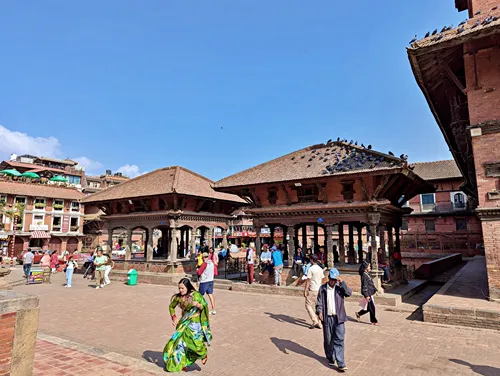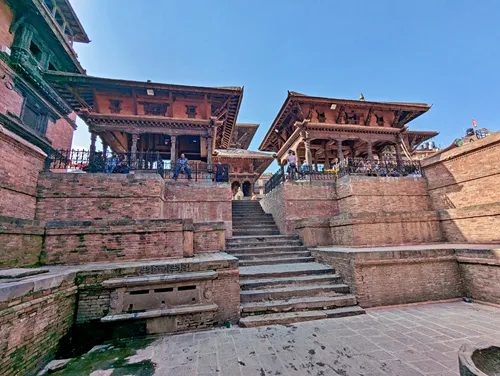Manimandap in Patan Durbar Square: Your Guide to the Jewel Pavilions - Nepal Purple Travel Guide
(map, reviews)
This is Premium Content! To access it, please download our
Backpack and Snorkel Purple Travel GuideAcross the street from Vishwanath Temple, to the east, there are two identical pavilions known as Mani mandapa or Jewel Pavilion.


Here at Backpack and Snorkel Travel Guides, we typically promote self-guided walking tours.
But we realize that not everybody likes to walk by themselves in a foreign city. So, just in case that you rather go with ab guide: NO PROBLEM! Please see the Viator tours below.
free GuruWalk tours
paid Viator tours
History of Manimandap
The two Manimandap pavilions are believed to have been constructed during the reign of King Yoganarendra Malla, with inscriptions dating their origin to around 1758.
In ancient times, mandapas like these were used for royal coronations, public audiences, and religious ceremonies, serving as open pavilions where kings and priests could engage with the people during major events.
Origin of the Name Manimandap
The name ‘Manimandap’ is derived from Sanskrit:
'Mani' means jewel or precious.
'Mandap' refers to a pavilion or ceremonial hall.
Together, Manimandap can be interpreted as a ‘jewel pavilions’.
There is a fascinating local legend tied to the Manimandap: it is said that precious gems once fell from the ceiling of these pavilions, giving rise to the name ‘Jewel Pavilion’. While, unfortunately, no gems fall today, the story adds a touch of mystique to the pavilions.
Architectural Features of Manimandap
The structure features raised stone bases, wooden pillars, and flat roofs, in contrast to the towering pagodas around them. The simplicity of their form is balanced by the fine detail in its wood carvings and decorative motifs, characteristic of Newar craftsmanship.
Back to your self-guided tour
Author: Rudy at Backpack and Snorkel
Bio: Owner of Backpack and Snorkel Travel Guides. We create in-depth guides to help you plan unforgettable vacations around the world.
Other popular Purple Travel Guides you may be interested in:
Like this Backpack and Snorkel Purple Travel Guide? Pin these for later:





